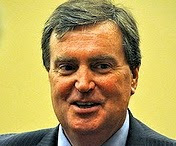 |
| Rockville Mayor-Elect Monique Ashton |
Rockville election results unofficially show Monique Ashton has been elected to serve as the city's next mayor. Ashton's full Rockville United slate was slightly less successful, as voters chose Barry Jackson, incumbent Dr. David Myles, and Adam Van Grack over slate member Paul Scott. Rockville United slate members Kate Fulton, Izola Shaw, and Marissa Valeri were victorious, however, giving Ashton a potential 4-3 working majority on any issue the slate members have consensus on.
Rockville voters spoke loudly and clearly on a series of controversial ballot questions, overwhelmingly opposing allowing non-citizens to vote in City elections, electing councilmembers by districts rather than At-Large, and allowing residents as young as 16 to vote in City elections. Term limits, by contrast, were a winning proposal for the low-turnout electorate; the mayor and council could be limited to 3 terms in the future, should Ashton and the Council enact the non-binding term limits initiative approved by a whopping 74% of voters yesterday.
Ashton will be the City's first mayor of color when she takes the oath of office at an inauguration ceremony for the new Mayor and Council at 1:00 PM on Sunday, November 19, 2023 at F. Scott Fitzgerald Theatre, located at 603 Edmonston Drive. The public is invited to attend the ceremony. She defeated long-serving Councilmember Mark Pierzchala by an unofficial margin of 58.71% to 40.88%.
Voters likely took note of Ashton's very active term on the City Council. At a time when Rockville businesses were struggling during the pandemic, Ashton was highly-visible and engaged in public events and business ribbon-cuttings where other elected officials were often missing. And while her election is historic for the City - in contrast to some politicians - she did not make breaking that racial barrier a focus of her campaign, instead making her case to voters solely on her record and vision for the future of Rockville.
Incumbent Councilmember Dr. David Myles rivaled Bill Clinton as the "Comeback Kid" of last night's contest. Despite a stellar personal resume as a physician and U.S. Navy veteran, Myles' political career teetered this fall when an alleged episode of domestic violence resulted in his arrest, and the arrest of his wife. Both were initially charged in the case. The ensuing TV news coverage raised sincere concerns among advocates for victims of domestic violence, but was also seized upon by some who disfavored his reelection.
While there were calls for Myles to end his campaign, Rockville City police officers cited his wife as the "primary aggressor" in the incident, and the assault charge against him was eventually dropped. Myles briefly reignited the controversy by making an introductory statement on a domestic violence-related Mayor and Council agenda item a few weeks after the incident. A few of his colleagues, and some residents attending that meeting, denounced Myles' remarks shortly after they were delivered, stating that he was not to have been the councilmember to introduce the resolution. It was unclear how Myles gained the floor to speak, if that had been decided beforehand.
Although it would be considered a serious political error by most people to have engaged in the topic of domestic violence at a time when he was being told by many to step aside, Myles' remarks were touching on a legitimate topic: abuse or violence against men by their spouse or partner. It is a matter that often receives little attention in the discussion of domestic violence. Myles' reelection - and the dropping of the charge - give him some level of public vindication, as well as four years in which to try to put the episode behind him with new political accomplishments.
Fulton, Jackson, Valeri and Van Grack scored convincing victories through name recognition from their active participation in the community over the years. Jackson and Van Grack were able to prevail over the Rockville United slate by combining that with a tremendous amount of old-fashioned hard work in their campaigns over the summer. Both corralled lengthy lists of prominent endorsers, with names that could boost a campaign. Van Grack ran what was arguably the most sophisticated and media-savvy campaign of all the contenders, and it paid off at the polls, as he received the second-highest vote total of the five elected to the City Council. Shaw put together a compelling progressive message, and rode that ideological lane to victory.
Despite the controversial ballot questions, turnout remained low in the 2023 City election. One reason for this may have been the lack of clear contrasts on development issues in the race. For example, only Pierzchala and Council candidate Anita Neal Powell stated that they opposed the construction of multifamily housing in single-family-home neighborhoods. Both lost.
The consensus of so many candidates in favor of such a contentious proposal suggests a sea change in city politics. Ashton follows two strong-willed mayors who will be remembered for blocking - at least temporarily - urbanization plans that would have upended the city's suburban character and decimated its booming Rockville Pike retail sector. Newton and the late Phyllis Marcuccio pulled out all the stops to appoint Rockville Planning commissioners who represented the interests of residents, as opposed to the developer-beholden Montgomery County Planning Board. Developers came back again and again with attempts to water down infrastructure requirements, and sometimes won with this battering ram approach. But the city's character held, and Herculean efforts by Marcuccio and Newton saved neighborhoods and the Rockville Pike shopping corridor that is the highest generator of commercial revenue in - and for - the state of Maryland.
As such, Ashton's future nominees to the Planning Commission will be awaited with great interest. Her level of commitment - and that of her new colleagues - to a Thrive 2050-style bulldozing of single-family-home neighborhoods like Twinbrook and Hungerford will also be closely monitored. In her previous campaign as an ally of Newton, and in her time on the Council over the last four years, Ashton has appeared to favor responsible growth policies. If she can maintain that, and play 4-D chess with Planning Commission appointments like her two immediate predecessors, Ashton will join them in being remembered for defending the interests of residents, under enormous pressure from builders of multifamily housing and the media outlets they control.
Still, in the short term, there's a sense that advocates of responsible growth have temporarily and unexpectedly ceded the political stage in Rockville. A sense that people who should have run in this election - with its many open seats - didn't. The hyperventilation and overeager campaigning by developer-controlled media outlets like Greater Greater Washington bordered on the comical in this election, as a result. All the articles, endorsements, and region-wide social media mistargeting were largely a waste of time and energy. There was no contest on the next major development issues in this election. Just as Pierzchala and Powell were the only candidates who told GGW that they opposed Thrive 2050-style upzoning of neighborhoods, Richard Gottfried was the only person running who had taken an outspoken public stance in favor of responsible growth in the past. He, too, lost. But even if all three had won, they would not have been able to form a majority on certain growth issues.
So, maintaining the character of Rockville will be a serious challenge in the upcoming Mayor and Council term. Other challenges will include the struggles of businesses and the empty storefronts of Rockville Town Center, a persistent spike in crime, and a lack of civic participation in elections. The first meeting of the new Mayor and Council will be held on Monday, November 20, 2023 at 7:00 PM at City Hall.














